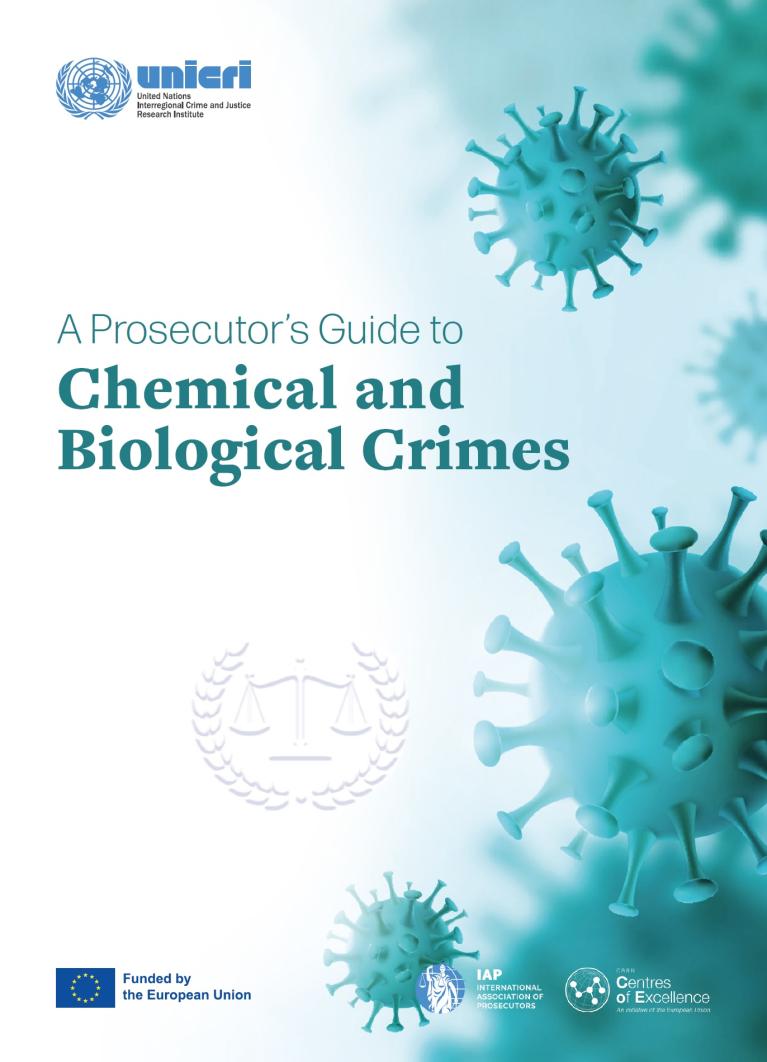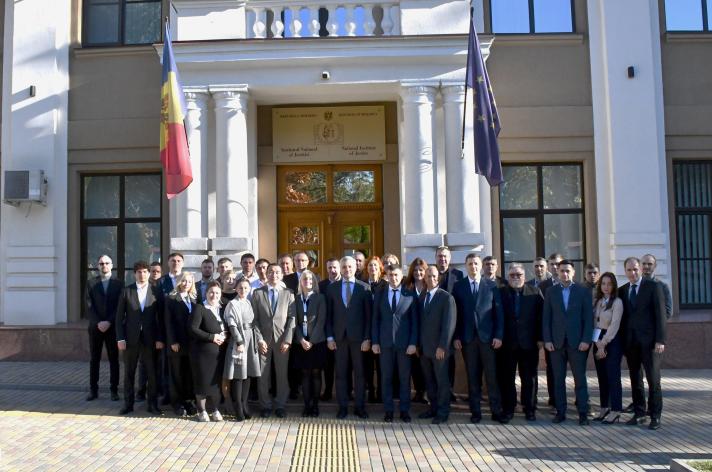
Chemical, biological, radiological, and nuclear (CBRN) materials have often been used deliberately to harm human beings and the surrounding environment. Gas mustard, nerve agent sarin, biological anthrax spores, or chemical weapons, are a few of the hazardous materials that have been intentionally released in the past to disrupt life. The high impact of any incident involving the use of such agents testify to the relevance of increasing awareness and the skills needed to investigate and prosecute CBRN crimes.
Tabletop exercise: pilot project kicks off
In a pioneering effort to strengthening CBRN risk mitigation, Moldova has launched a pilot training project aimed at enhancing the country’s capacities to investigate, prosecute and adjudicate criminal cases involving CBRN materials.
Supported by the European Union within the framework of the EU CBRN Centres of Excellence, the pilot capacity-building project kicked off in Chisinau with a two-day (5-6 November) tabletop exercise (TTX). This workshop marks the first phase of a series of capacity-building and training sessions aimed at assessing Moldova’s current challenges, identifying gaps, and setting priorities in the prosecution and adjudication of CBRN cases.
The TTX focused on raising awareness among policymakers about the importance of establishing a national CBRN team and actively engaging key stakeholders in the broader CBRN context. This exercise is a critical step in ensuring that the project’s future activities align with Moldova’s needs and expectations, further reinforcing its commitment to strengthening national capabilities.
Organised by the United Nations Interregional Crime and Justice Research Institute (UNICRI) and hosted by Moldova’s National Institute of Justice, the TTX was conducted in close coordination with the General Prosecutor’s Office and the Supreme Council of Prosecutors of Moldova. Representatives from key national agencies* attended the workshop.
“For the Republic of Moldova, this marks a new and critical area of investigation and prosecution. Given the current regional challenges, this training is both timely and necessary. I am proud that, together with the National Institute of Justice, we have made this event possible, bringing together prosecutors, judges, and other key legal professionals. We must be prepared with the skills and tools necessary to identify and prosecute these complex crimes when they arise.”
Ion Munteanu, General Prosecutor of the Republic of Moldova
“This event brings together a diverse range of national experts, including prosecutors, judges, and other key stakeholders. This approach fosters inter-institutional cooperation and strengthens our collective ability to respond to these critical matters. Such collaboration is essential for the more effective prosecution of these crimes. We remain committed to working with our international partners and are optimistic that this event will be a key step toward establishing Moldova as a regional Center of Excellence in CBRN-related matters.”
Adrian Cerbu, Director of the National Institute of Justice
A lasting foundation for strengthening CBRN risk mitigation
The complete training project envisages both theoretical and practical learning, comprising 50 capacity-building modules approximately. Upon finalizing the project, some of these selected modules will be integrated into Moldova’s national training curriculum, establishing a lasting foundation for effective investigation, prosecution and adjudication of CBRN cases.
The modules include workshops on building CBRN cases, prosecuting CBRN crimes, and conducting mock trial sessions. A key component of the program is the Train-the-Trainer initiative, designed to ensure the sustainability and continuity of the knowledge transfer within Moldova’s judicial and law enforcement systems.
Moldova’s initiative has garnered significant international attention, with over 12 countries considering the adoption of similar training programs. This highlights the project’s potential as a model for regional and international collaboration.
This project represents a vital step forward for Moldova in building the expertise needed to address complex CBRN risks and threats effectively, showcasing a collaborative approach that could serve as a valuable model for other countries facing similar challenges.
“The European Union’s support is crucial, particularly given our geopolitical context and the challenges we face. As we move forward with the investigation and prosecution of these complex crimes, we must carefully plan the necessary steps. In this training, we have prosecutors who have already worked on similar cases, enriching our understanding from identification to the adjudication of criminal cases.”
Dumitru Obada, President of the Supreme Council of Prosecutors of Moldova
A Prosecutor’s Guide to CBRN crimes
The training is grounded in two essential CBRN resources: A Prosecutor’s Guide to Chemical and Biological Crimes and A Prosecutor’s Guide on Radiological and Nuclear Crimes. The guidebooks aim to provide police, prosecutors, and relevant investigative agencies with guidance to support the successful prosecution of incidents involving the deliberate acquisition, stockpiling, production, transfers, or use of chemical or biological agents.
Developed by UNICRI in close cooperation with relevant partner international organisations and experts, the resources aim to advance guidance on policies, recommendations and best practices to enforce and build up forensics capabilities in the domain.
Both guidebooks have been translated into multiple languages, including Arabic, French, English, Spanish, Romanian, Russian, and Ukrainian, ensuring accessibility for a wide range of end-users.
Funded by the European Union within the framework of the EU CBRN Centres of Excellence, the guidebooks cover a wide spectrum of key elements necessary to bring a radiological or nuclear crime from the crime scene to the courtroom.

This Guide aims to provide police, prosecutors, and relevant investigative agencies with guidance to support the successful prosecution of incidents involving the deliberate acquisition, stockpiling, production, transfers, or use of radiological or nuclear agents.
Developed by UNICRI with EU CBRN CoE support, it is the second in a series of CBRN forensics guidebooks aimed to advance guidance on policies, recommendations and best practices to enforce and build up forensics capabilities in the domain.

This Guide aims to provide police, prosecutors, and relevant investigative agencies with guidance to support the successful prosecution of incidents involving the deliberate acquisition, stockpiling, production, transfers, or use of chemical or biological agents.
Developed by UNICRI with EU CBRN CoE support, it is the first in a series of CBRN forensics guidebooks aimed to advance guidance on policies, recommendations and best practices to enforce and build up forensics capabilities in the domain.
* The Tabletop Exercise (TTX) gathered representatives from the General Prosecutor’s Office, the Prosecutor’s Office for Combating Organized Crime and Specialized Cases, the Ministry of Justice, the Superior Council of Magistracy, the Supreme Council of Prosecutors, the General Inspectorate of Police, the General Inspectorate for Emergency Situations, the Ministry of Defense, the Ministry of Foreign Affairs, the Ministry of Health, the Security and Intelligence Service, the National Agency for Regulation of Nuclear and Radiological Activities, the Customs Service, and the National Institute of Justice.
Details
- Publication date
- 14 November 2024
- Authors
- Service for Foreign Policy Instruments | Joint Research Centre
- CBRN areas
- Bio-safety/bio-security
- Denying support for misuse and terrorism
- Illicit trafficking
- Investigation and prosecution
- Public health impact mitigation
- Safety and security
- CBRN categories
- Chemical
- Biological
- Radiological
- Nuclear
- CoE Region
- SEEE - South East and Eastern Europe

